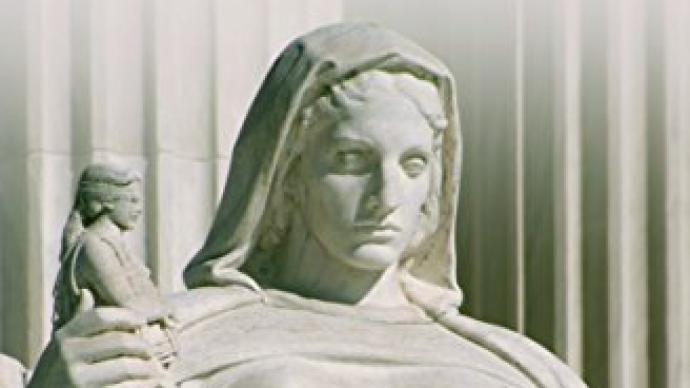
On June 24, local time, the U.S. Supreme Court overturned the 1973 "Roe v. Wade" ruling, denying that the right to abortion is a constitutional right, and leaving the legality of abortion to the states. It’s worth thinking about how the U.S. Supreme Court divided America in the ongoing debate after it legalized abortion in Roe v. Wade nearly 50 years ago.
Conflict is not inevitable. If abortion is full of universal debates—religion versus sex, gender versus autonomy, life versus death—it doesn’t divide America as much in other countries. As of 1975, two years after the U.S. Supreme Court's landmark 7-2 decision in Roe v. Wade, Roe faced little resistance to the point that the first Supreme Court justice appointed after the ruling Judge John Paul Stevens was not even asked for his opinion on this during the confirmation hearing.
It would be an oversimplification to attribute all of the country's divisions over abortion to the fact that the United States created abortion policy through the courts, not legislation. The point is that leaders on both sides of the issue have sought to exploit the tensions of American character — American individualism, feminism, religious beliefs, and conservative attitudes toward sexuality — to politicize the matter for political gain.
As a result, Americans today now find that half a century after the Roe v. Wade ruling, the country has become so divided that, as the feminist writer Katha Pollitt observed, That way, "abortion is one of those topics where people have not only their own opinions, but their own facts". In fact, even the medicine of abortion is controversial in the United States. Does abortion cause emotional harm to women? When does the fetus start to feel pain during pregnancy? The answers to these questions largely depend on who you ask.
To help readers understand how America got this far, The New York Times has put together a list of 10 books . Five of the books explore the legal, political, and social underpinnings of abortion in the United States, and the other five explore everything that has been involved in abortion since Roe v. Wade: Violence and Stigma, Politics and Race, Medicine and law, philosophy and medicine.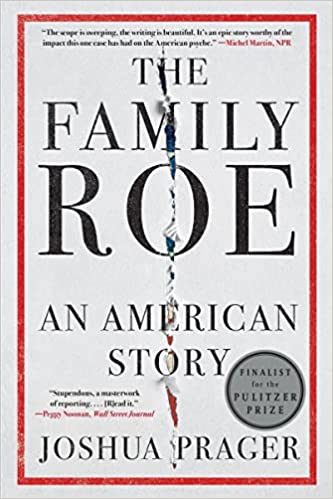
1. Abortion in America: The Origins and Evolution of National Policy, by James C. Mohr, 1978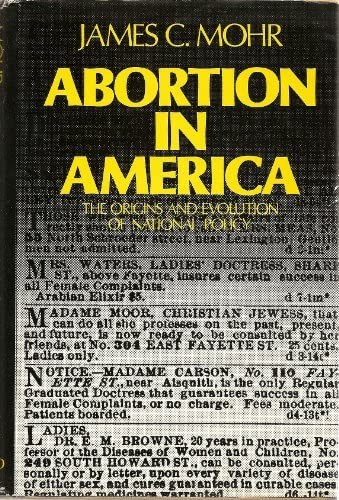 Rooted in the 19th century, this precious book is the foundational history of anti-abortion laws in the United States. It examines how and why abortion was criminalized, which is critical to understanding the subsequent fight for its legalization.
Rooted in the 19th century, this precious book is the foundational history of anti-abortion laws in the United States. It examines how and why abortion was criminalized, which is critical to understanding the subsequent fight for its legalization.
2. Liberty and Sexuality: The Right to Privacy and the Making of Roe v. Wade, by David Garrow, 1994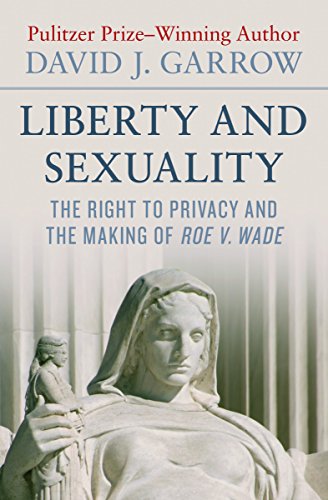 Every movement needs its clear history. The book provides the detail and scope of it, a methodical account of Americans' struggle for reproductive rights through half a century, culminating in Roe v. Wade. This book is both rigorous and monumental.
Every movement needs its clear history. The book provides the detail and scope of it, a methodical account of Americans' struggle for reproductive rights through half a century, culminating in Roe v. Wade. This book is both rigorous and monumental.
3. Before Roe v. Wade: Voices That Shaped the Abortion Debate Before the Supreme Court's Ruling by Linda Greenhouse Greenhouse, Reva Siegel, 2010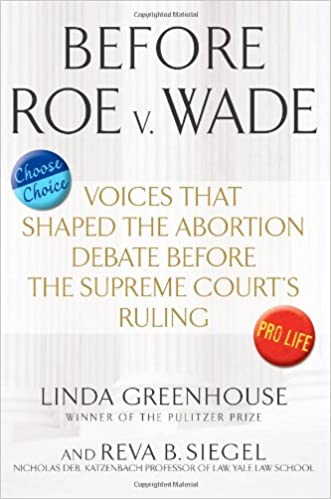 Primary sources are critical to understanding how history came to be. The book presents readers with a wealth of original documents, including letters, memos, and legal briefs, that together inform the abortion war as we know it today.
Primary sources are critical to understanding how history came to be. The book presents readers with a wealth of original documents, including letters, memos, and legal briefs, that together inform the abortion war as we know it today.
4. Abortion & the Politics of Motherhood, by Kristin Luker, 1984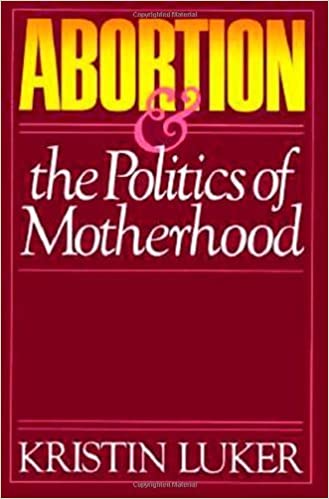 When Luo was 11, the book’s author, Luke — a sociologist, not a legal historian — showed that America’s abortion divide was widening. Most importantly, it comes from class distinctions. This observation has far-reaching implications.
When Luo was 11, the book’s author, Luke — a sociologist, not a legal historian — showed that America’s abortion divide was widening. Most importantly, it comes from class distinctions. This observation has far-reaching implications.
5. Defenders of the Unborn: The Pro-Life Movement before Roe v. Wade, Daniel K. Williams . Williams), 2016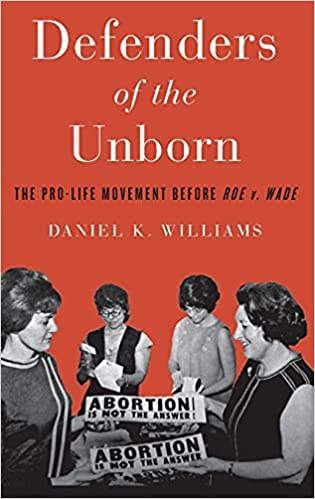 The book profiles those who led the struggle against Luo who felt they were bound by politics or religion rather than values. The book's perspective is well-balanced, and it's a reminder that abortion has become a worrisome topic for good reason.
The book profiles those who led the struggle against Luo who felt they were bound by politics or religion rather than values. The book's perspective is well-balanced, and it's a reminder that abortion has become a worrisome topic for good reason.
6. After Roe: The Lost History of the Abortion Debate, by Mary Ziegler, 2015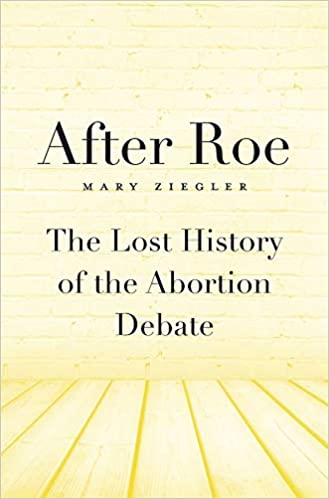 Fair and tough, this book depicts how abortion politics has degenerated into partisanship and hatred. The author is a law professor and a prominent expert on Roe v. Wade.
Fair and tough, this book depicts how abortion politics has degenerated into partisanship and hatred. The author is a law professor and a prominent expert on Roe v. Wade.
7. Wrath of Angels: The American Abortion War, James Risen, Judy L. Thomas, 1998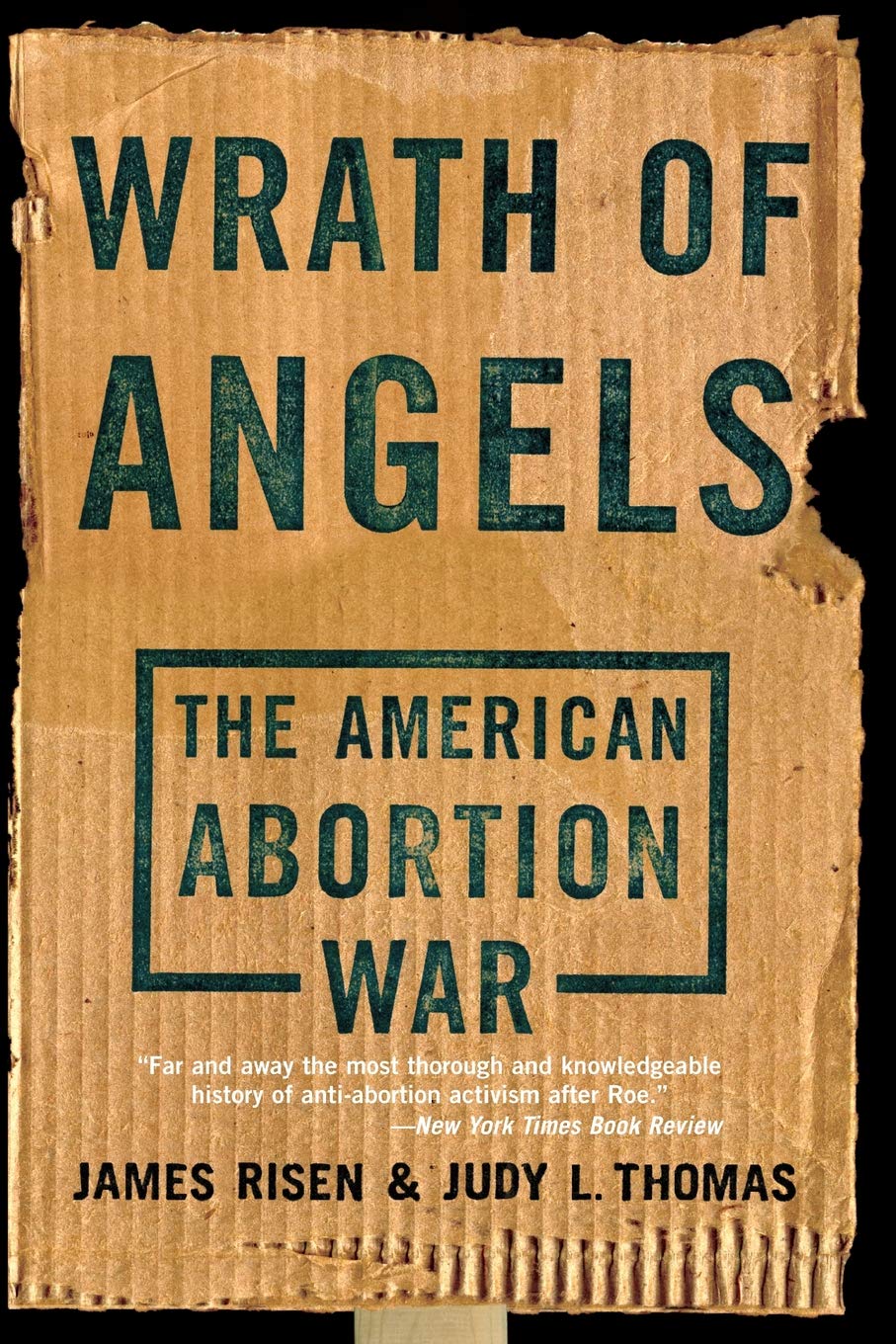 The book humanizes evangelical efforts to stop abortion and charts its profound impact on America's culture wars. It's a gripping history book.
The book humanizes evangelical efforts to stop abortion and charts its profound impact on America's culture wars. It's a gripping history book.
8. Abortion After Roe, Johanna Schoen, 2015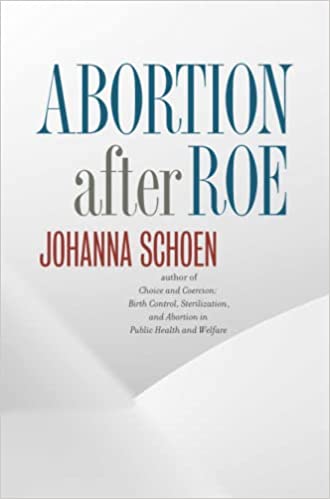 This book brilliantly sheds light on what it means to provide abortion in America today, and what its appeal is. This provides a window into the many aspects involved in abortion, including gender and race.
This book brilliantly sheds light on what it means to provide abortion in America today, and what its appeal is. This provides a window into the many aspects involved in abortion, including gender and race.
9. Scarlet A: The Ethics, Law, and Politics of Ordinary Abortion, Katie Watson, 2018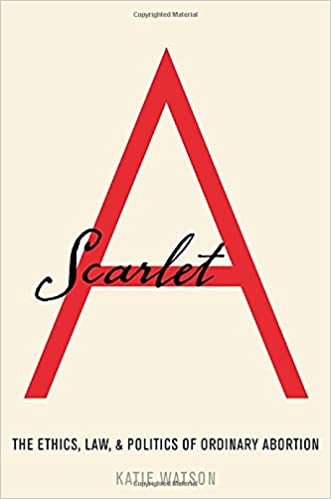 Written by a bioethicist and lawyer, this book presents the existing philosophical rationale for and against abortion. It's also a clear look at the most common form of abortion in the United States, which is widespread and often stigmatized.
Written by a bioethicist and lawyer, this book presents the existing philosophical rationale for and against abortion. It's also a clear look at the most common form of abortion in the United States, which is widespread and often stigmatized.
10. What It Means to Be Human: The Case for the Body in Public Bioethics, by O. Carter Snead , 2020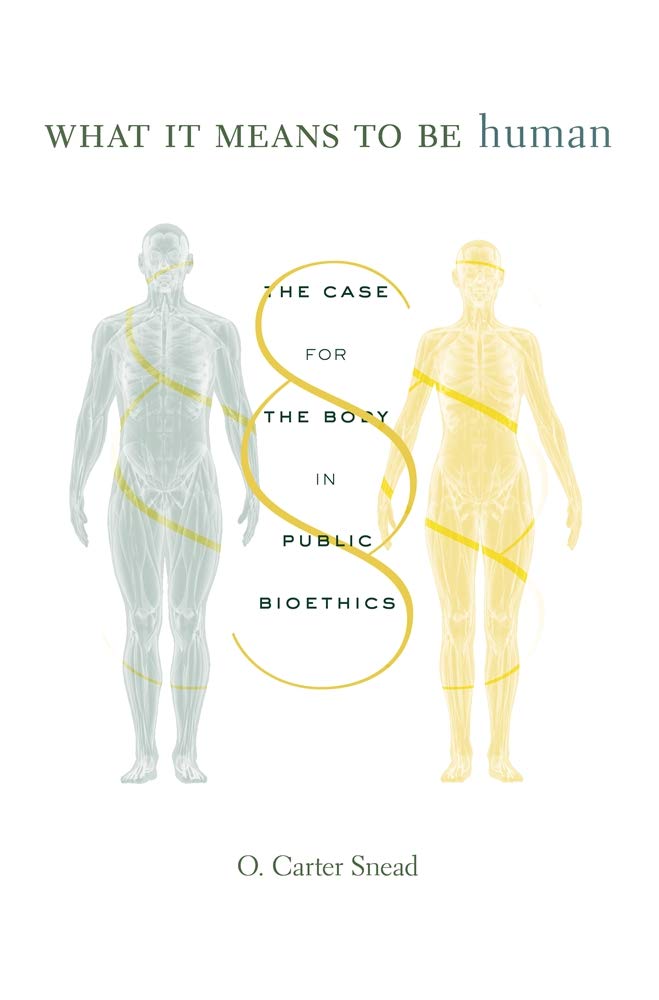 With powerful insight and stark provocation, bioethicist Sneed examines the questions that abortion raises about the meaning of human life.
With powerful insight and stark provocation, bioethicist Sneed examines the questions that abortion raises about the meaning of human life.
Conflict is not inevitable. If abortion is full of universal debates—religion versus sex, gender versus autonomy, life versus death—it doesn’t divide America as much in other countries. As of 1975, two years after the U.S. Supreme Court's landmark 7-2 decision in Roe v. Wade, Roe faced little resistance to the point that the first Supreme Court justice appointed after the ruling Judge John Paul Stevens was not even asked for his opinion on this during the confirmation hearing.
It would be an oversimplification to attribute all of the country's divisions over abortion to the fact that the United States created abortion policy through the courts, not legislation. The point is that leaders on both sides of the issue have sought to exploit the tensions of American character — American individualism, feminism, religious beliefs, and conservative attitudes toward sexuality — to politicize the matter for political gain.
As a result, Americans today now find that half a century after the Roe v. Wade ruling, the country has become so divided that, as the feminist writer Katha Pollitt observed, That way, "abortion is one of those topics where people have not only their own opinions, but their own facts". In fact, even the medicine of abortion is controversial in the United States. Does abortion cause emotional harm to women? When does the fetus start to feel pain during pregnancy? The answers to these questions largely depend on who you ask.
To help readers understand how America got this far, The New York Times has put together a list of 10 books . Five of the books explore the legal, political, and social underpinnings of abortion in the United States, and the other five explore everything that has been involved in abortion since Roe v. Wade: Violence and Stigma, Politics and Race, Medicine and law, philosophy and medicine.

The Lo Family: An American Story
This list is provided by Joshua Prager, a dual biography of both plaintiff and defendant in Roe v. Wade, The Family Roe: An American Story author. Written over 10 years by Praj, this book tells the story of abortion in America through people, not politics.1. Abortion in America: The Origins and Evolution of National Policy, by James C. Mohr, 1978
 Rooted in the 19th century, this precious book is the foundational history of anti-abortion laws in the United States. It examines how and why abortion was criminalized, which is critical to understanding the subsequent fight for its legalization.
Rooted in the 19th century, this precious book is the foundational history of anti-abortion laws in the United States. It examines how and why abortion was criminalized, which is critical to understanding the subsequent fight for its legalization.2. Liberty and Sexuality: The Right to Privacy and the Making of Roe v. Wade, by David Garrow, 1994
 Every movement needs its clear history. The book provides the detail and scope of it, a methodical account of Americans' struggle for reproductive rights through half a century, culminating in Roe v. Wade. This book is both rigorous and monumental.
Every movement needs its clear history. The book provides the detail and scope of it, a methodical account of Americans' struggle for reproductive rights through half a century, culminating in Roe v. Wade. This book is both rigorous and monumental.3. Before Roe v. Wade: Voices That Shaped the Abortion Debate Before the Supreme Court's Ruling by Linda Greenhouse Greenhouse, Reva Siegel, 2010
 Primary sources are critical to understanding how history came to be. The book presents readers with a wealth of original documents, including letters, memos, and legal briefs, that together inform the abortion war as we know it today.
Primary sources are critical to understanding how history came to be. The book presents readers with a wealth of original documents, including letters, memos, and legal briefs, that together inform the abortion war as we know it today.4. Abortion & the Politics of Motherhood, by Kristin Luker, 1984
 When Luo was 11, the book’s author, Luke — a sociologist, not a legal historian — showed that America’s abortion divide was widening. Most importantly, it comes from class distinctions. This observation has far-reaching implications.
When Luo was 11, the book’s author, Luke — a sociologist, not a legal historian — showed that America’s abortion divide was widening. Most importantly, it comes from class distinctions. This observation has far-reaching implications.5. Defenders of the Unborn: The Pro-Life Movement before Roe v. Wade, Daniel K. Williams . Williams), 2016
 The book profiles those who led the struggle against Luo who felt they were bound by politics or religion rather than values. The book's perspective is well-balanced, and it's a reminder that abortion has become a worrisome topic for good reason.
The book profiles those who led the struggle against Luo who felt they were bound by politics or religion rather than values. The book's perspective is well-balanced, and it's a reminder that abortion has become a worrisome topic for good reason.6. After Roe: The Lost History of the Abortion Debate, by Mary Ziegler, 2015
 Fair and tough, this book depicts how abortion politics has degenerated into partisanship and hatred. The author is a law professor and a prominent expert on Roe v. Wade.
Fair and tough, this book depicts how abortion politics has degenerated into partisanship and hatred. The author is a law professor and a prominent expert on Roe v. Wade.7. Wrath of Angels: The American Abortion War, James Risen, Judy L. Thomas, 1998
 The book humanizes evangelical efforts to stop abortion and charts its profound impact on America's culture wars. It's a gripping history book.
The book humanizes evangelical efforts to stop abortion and charts its profound impact on America's culture wars. It's a gripping history book.8. Abortion After Roe, Johanna Schoen, 2015
 This book brilliantly sheds light on what it means to provide abortion in America today, and what its appeal is. This provides a window into the many aspects involved in abortion, including gender and race.
This book brilliantly sheds light on what it means to provide abortion in America today, and what its appeal is. This provides a window into the many aspects involved in abortion, including gender and race.9. Scarlet A: The Ethics, Law, and Politics of Ordinary Abortion, Katie Watson, 2018
 Written by a bioethicist and lawyer, this book presents the existing philosophical rationale for and against abortion. It's also a clear look at the most common form of abortion in the United States, which is widespread and often stigmatized.
Written by a bioethicist and lawyer, this book presents the existing philosophical rationale for and against abortion. It's also a clear look at the most common form of abortion in the United States, which is widespread and often stigmatized.10. What It Means to Be Human: The Case for the Body in Public Bioethics, by O. Carter Snead , 2020
 With powerful insight and stark provocation, bioethicist Sneed examines the questions that abortion raises about the meaning of human life.
With powerful insight and stark provocation, bioethicist Sneed examines the questions that abortion raises about the meaning of human life.Related Posts